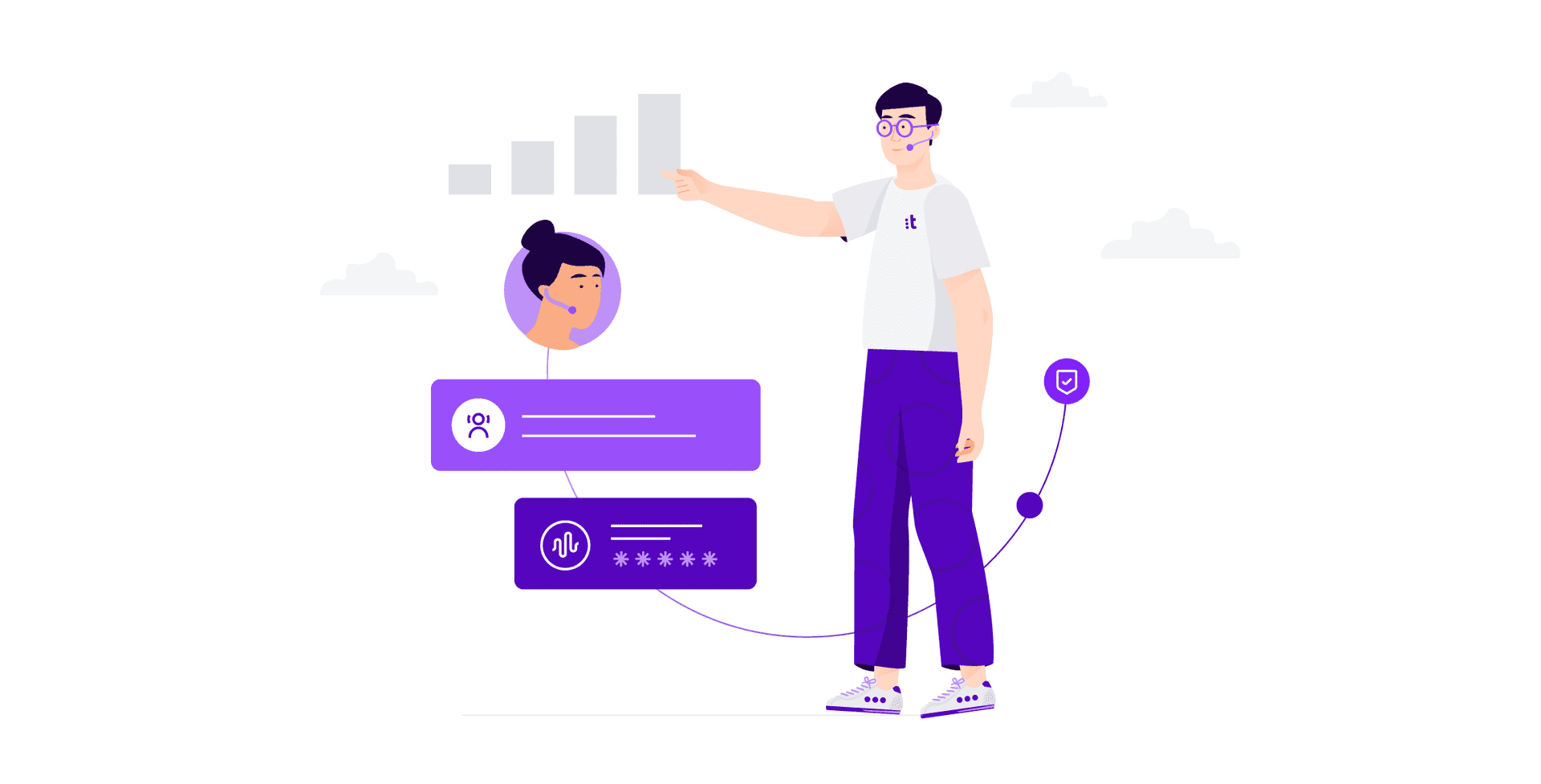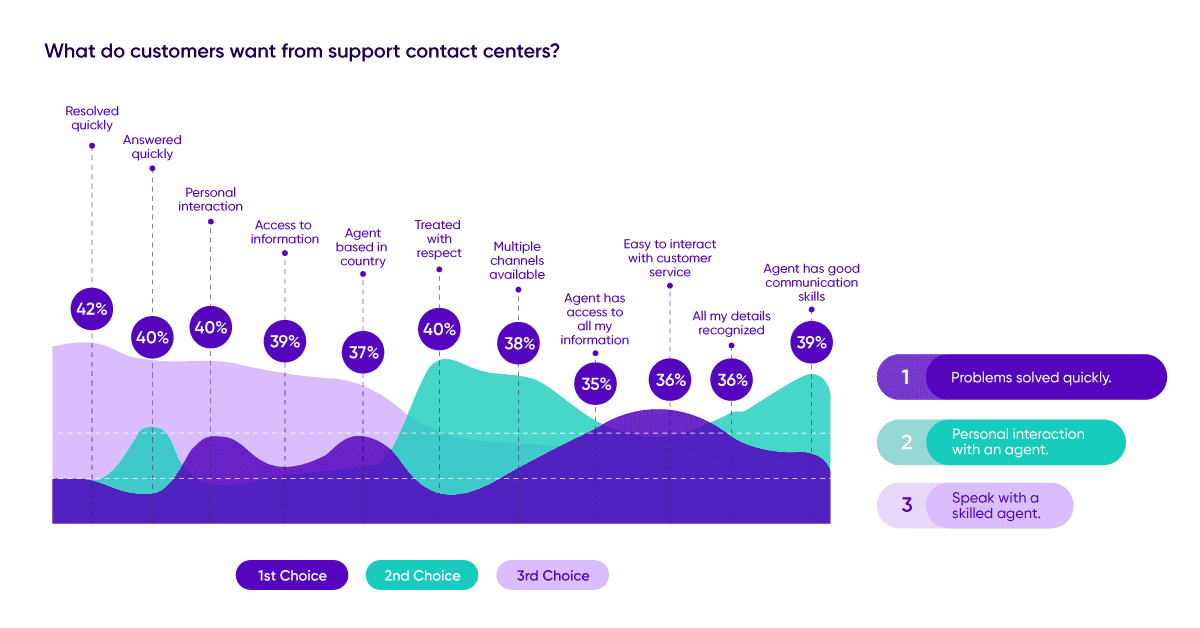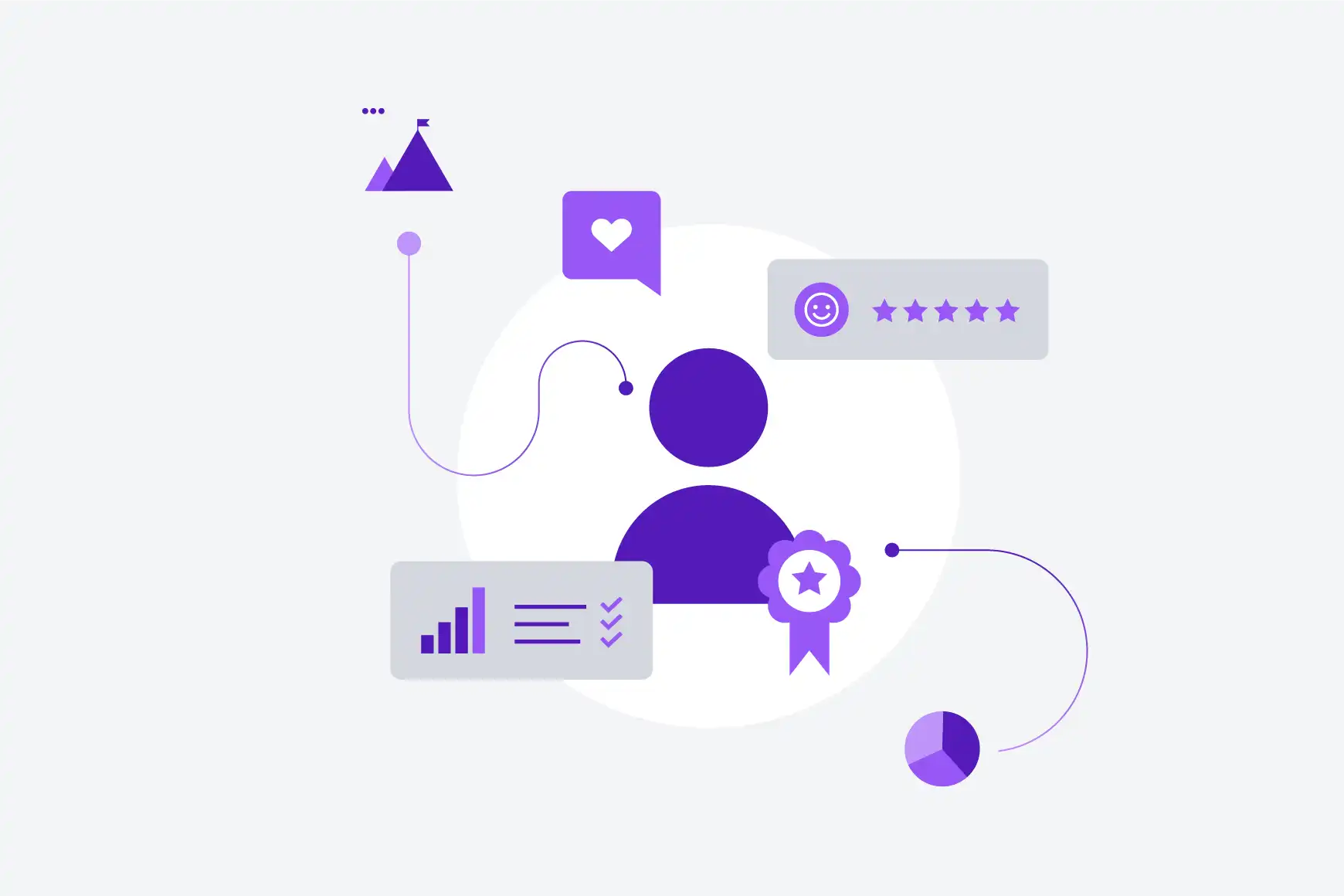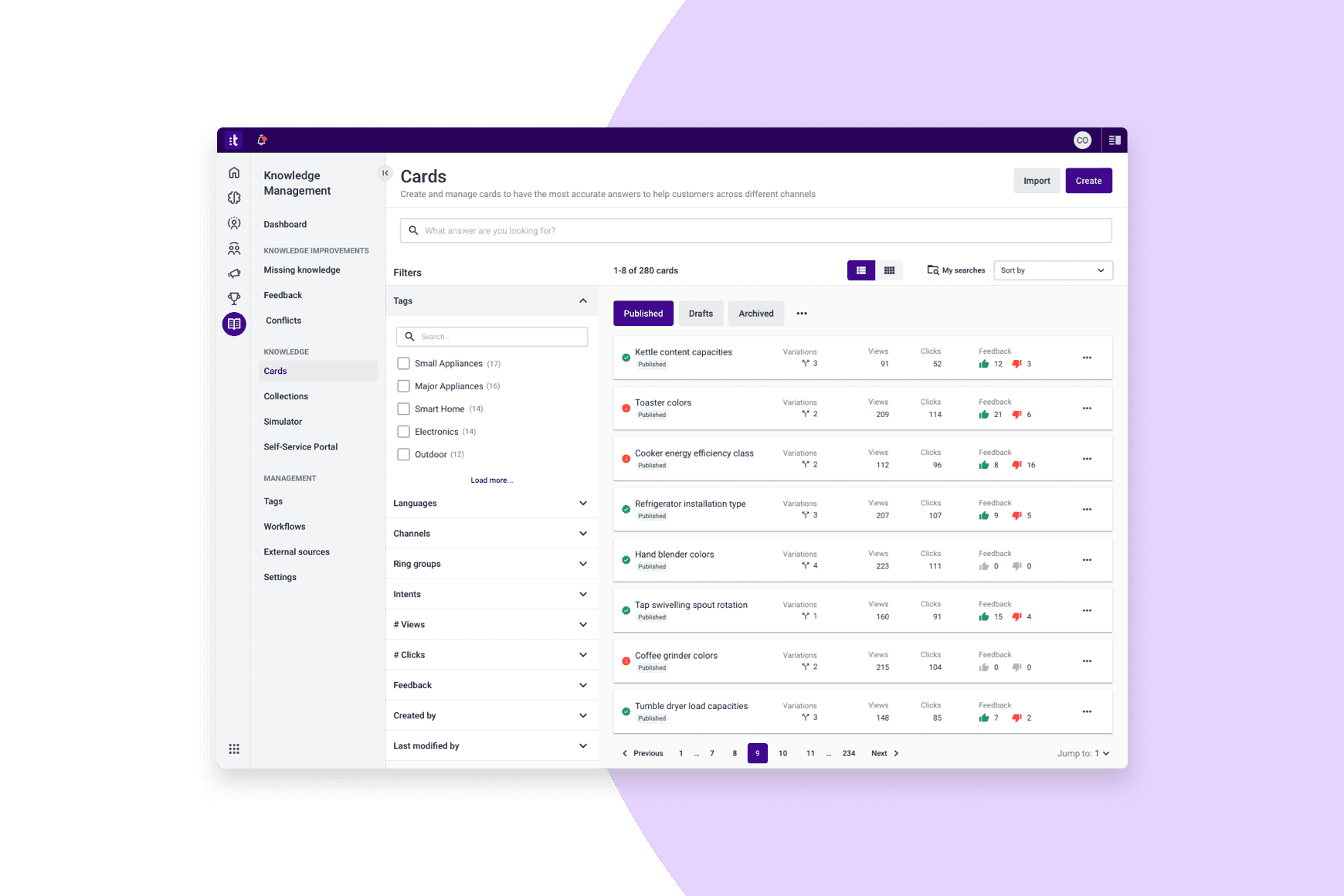15 sugestões para o seu programa de formação em call center superar as expetativas do cliente

Por Celia Cerdeira
0 minutos de leitura

Agora, mais do que nunca, os seus clientes exigem um serviço de apoio ao cliente de excelente qualidade. A maioria das pessoas fica a gostar e recomenda uma marca aos amigos se tiveram uma ótima experiência com o serviço de apoio ao cliente.
Se tiverem tido uma má experiência, é provável que desistam e nunca mais voltem. Claramente, existe muita pressão sobre a sua equipa para acertar, e tudo começa e termina com uma excelente formação do agente de call center.

Source: What Customers Want From Support Contact Centers
Apart from choosing intuitive and easy-to-use cloud contact center software, the most successful contact centers take a holistic approach when they train their agents.
Capacitam os agentes com tudo, desde a formação de colegas e o relacionamento com a equipa até capacidades técnicas e formação e outras. Oferecem oportunidades para tornarem-se especialistas em produtos, refletem sobre o desempenho individual e facilitam a experiência prática. E nunca param de ter formação. Os programas de formação bem-sucedidos dos centros de contacto reforçam continuamente as competências existentes e trabalham para construir novas.
Utilize esta lista de ideias para ajudar a elaborar os seus cursos de formação de call center. Certifique-se de que seus agentes recebem a formação adequada para poderem proporcionar uma experiência positiva e importante ao cliente e que manterá os seus clientes satisfeitos e felizes, e que lhe dará uma vantagem competitiva.
1. Início da nova formação de contratação com uma apresentação ao pessoal do call center.
Uma das melhores formas de conseguir que os novos agentes de apoio tenham um início positivo é apresentá-los a toda a equipa durante a sessão de formação inicial. Inclua na chamada os responsáveis do centro de contacto, bem como os seus colaboradores da linha de frente do centro de contacto. Peça que todos se apresentem, expliquem a sua função na equipa e forneçam as respetivas informações de contacto. Isto ajudará os novos agentes a dar um rosto a um nome e também pode ajudá-los quando necessário.
2. Dê formação aos seus novos agentes sobre a sua empresa.
As suas novas contratações devem ter uma compreensão abrangente da empresa, dos produtos e das operações do call center. Devem também receber informações sobre a cultura, a missão, os valores fundamentais e a visão da empresa e compreender a sua função para atingir as metas da empresa.
Com base neste entendimento, os seus agentes estarão bem preparados e confiantes quando interagirem com os clientes e, assim, fá-lo-ão de um modo apropriado e consistente com os seus valores comerciais.
3. Explicar a importância do cumprimento da programação
Schedule adherence refers to how closely call center professionals follow their whole schedule, including both productive and non-productive time. It’s a very important aspect of call center success because it helps managers understand how many staff members they need throughout the day so they can schedule accordingly. As they discover any gaps in adherence, they can identify further training opportunities that will help support agent success, and by extension, customer satisfaction.
A maioria das novas contratações não compreende totalmente como seguir o horário tem impacto no call center. Certifique-se de que os seus agentes estejam cientes e preparados para seguir o protocolo.
Também seria útil fornecer informação às novas contratações relativamente aos KPI que os managers avaliarão, de que forma estes estarão associados a avaliações de desempenho, bem como sugestões práticas sobre como atingir as suas referências de KPI. Isso preparará as suas novas contratações para estarem atentas a esses KPI e ajustarem a sua abordagem para interagirem com os clientes em conformidade.
4. Leve os agentes de alto desempenho para a formação.
One of the most effective ways to train a new agent is by example. This is where your top-performing agents can help you meet some of your training needs. As skilled agents, they continually provide good customer service and their knowledge can be very valuable to a new call center hire.
You can implement this type of training program by having your new hire shadow your top agents. By listening in on live customer calls, your new agent will be able to see firsthand how call center experts handle different kinds of customer concerns. They’ll also get to see how the experienced agent uses call center tools and software to improve efficiency and customer support.
Este tipo de experiência de formação colocará a fasquia alta para as novas contratações, melhorará a participação dos colaboradores e melhorará a sua perceção de como executar eficazmente o seu trabalho.

Ebook
Satisfazer o cliente atual
Saiba mais sobre cinco passos essenciais que qualquer organização pode dar para transformar a sua visão de CX numa realidade que faz os clientes voltarem, várias vezes.
5. Explique o seu papel na construção de relações com os clientes.
A great way to enhance agent motivation to provide outstanding service is to help them understand the role they play in building customer relationships. Educate them on customer lifetime value as well as the cost of a bad interaction. Let them know how the quality of the service they provide impacts customer conversion, retention, and loyalty.
Quando os seus funcionários da linha de frente compreenderem como as suas próprias capacidades de escuta e conhecimentos técnicos melhoram a satisfação do cliente, ficarão mais motivados para prestar um serviço de elevado nível e superar as expetativas.
6. Ensine aos agentes as melhores práticas de gestão de chamadas.
Os novos agentes devem receber muitos exemplos de tudo, que vão de saudações adequadas e técnicas de transferência a quando e como terminar uma conversa de forma educada. Os programas de formação do call center devem fornecer gravações de chamadas anteriores para que possam ouvir e avaliar, bem como guiões e outros materiais com os quais possam aprender a lidar de forma eficaz, eficiente e consistente com uma grande variedade de chamadas e autores de chamadas.
Encourage them to engage in role play practice with each other until your call handling best practices and related techniques become natural and automatic for them. Video conferencing between a new hire and an experienced team member can help employees learn the best way to handle challenging interactions. Don’t forget to consider online training or online courses as a way for team members to learn at their own pace.
7. Ensine aos agentes a excelência da etiqueta do call center.
Quando os seus agentes souberem de forma precisa o que dizer e o que não dizer, estarão mais preparados para fornecer um serviço excelente. Consegue isso ensinando-os sobre a excelência da etiqueta do call center e informando-os sobre as orientações da etiqueta.
While some of these guidelines can be taught in call center school, depending on your call center focus it may require more customized training, or time spent in a student/mentor role with a more experienced call center agent. Develop your call center training to include soft skills like active listening and conflict de-escalation.
8. Informe-os sobre o resultado desejado.
As part of providing fantastic service, the overarching goals as call center staff are to increase sales, and to resolve a customer’s issue upon first contact. Your agents should know their goals and learn how to achieve them within each call. Obstacles that arise should be taken as opportunities to refine knowledge management so that agent performance can be improved.
Para fazê-lo eficazmente em cada chamada, apresente o conceito desses objetivos aos seus agentes durante a formação no call center e continue a reforçar essas normas e práticas ao longo do tempo com formação suplementar, cursos autodidatas, seminários, exercícios de criação de espírito de equipa, aprendizagem online, e muito mais.
9. Mostre aos agentes como encontrar respostas para as suas perguntas.
Do you have a knowledge base? If so, teach your new hires how to use it (and make sure your seasoned agents know how too). What about a technical support department? Be sure to teach your agents how to conference them into a call smoothly and without causing the call to drop. And what about having managers that are available to join a live call? Do you have a rockstar agent in a particular department? If so, great! Knowledge management is critical to achieving that first call resolution.
Certifique-se de que os seus agentes conheçam todos os recursos à sua disposição e incentive-os a entrar em contacto sempre que precisarem de ajuda. Mais cedo ou mais tarde, os estagiários deparar-se-ão com perguntas dos clientes às quais não saberão como responder e é extremamente importante que saibam onde procurar e a quem pedir ajuda. Ter recursos disponíveis dar-lhes-á confiança para enfrentar o problema, bem como ensinar-lhes-á a maneira correta de fazê-lo, evitando a tentação de sugerir algo de que não estão certos como forma de terminar a chamada.

DEMO
Transforme o seu apoio ao cliente com o Talkdesk Knowledge Management
Capacite a sua equipa do serviço de apoio ao cliente com uma gestão eficaz da base de conhecimento para oferecer respostas mais rápidas e mais precisas e elevar os níveis de satisfação do cliente.
10. Dê formação aos seus agentes individualmente.
O tempo de proficiência de um novo agente de call center pode variar dependendo de alguns fatores diferentes:
- O quanto as suas novas contratações já sabem sobre o seu produto ou serviço.
- A complexidade do produto ou serviço.
- O quanto precisa que os seus agentes memorizem.
- Protocolos de formação.
- Estratégias de gestão.
Keep these variables in mind when training agents. Always have an eye out for learning or knowledge gaps and do your best to adjust your approach to training in an effort to fill them. There are no one size fits all call center training courses that get your performance metrics from good to excellent. Keep an open mind and be ready to continually refine your training.
11. Certifique-se de que a sua formação seja prática e interativa.
Os agentes muitas vezes aprendem melhor ao fazer. Como mencionado acima, formar uma equipa com os seus agentes através do trabalho com acompanhamento e de representação de papéis pode ser uma ótima forma de se livrarem de ansiedades e de desenvolverem outras competências.
Talvez uma das coisas mais importantes que possa fazer seja encorajar os seus agentes a conhecerem extremamente bem o seu produto para que se sintam à vontade para falar sobre ele e solucionar os problemas. Dê-lhes tempo suficiente para aprenderem não apenas sobre o seu produto, mas também sobre o seu software de call center e os seus elementos interativos.
Quanto mais confiantes e confortáveis os seus agentes se sentirem ao receber chamadas, mais felizes os seus clientes ficarão com o serviço que lhes é prestado.
12. Utilize vídeos no seu currículo.
Videos are a great way to engage your agent trainees. Don’t have the budget to produce your own training curriculum? Don’t worry. There are great videos out there for you to use.
Os vídeos têm a vantagem fantástica de estar disponíveis para os agentes assistirem à sua própria conveniência e proporcionar-lhes uma forma fácil de consultar um que já viram se precisarem de uma atualização. Integrar os vídeos no seu sistema de formação online é uma forma de expandir a formação de call center a todos os seus agentes.
13. Disponibilize gravações de chamadas que demonstrem um ponto específico.
One of the best ways for call center agents to learn how to interact with customers is to hear recordings from previous calls. Choose recordings that will help you demonstrate a specific point—how to handle an angry customer, what to say if you don’t know the answer to their question, how to give a customer refund, and more. Letting your new hires hear for themselves the “right way” and the “wrong way” to respond to callers will give them a better understanding of how they should respond in similar situations.
14. Avalie constantemente o seu progresso.
Throughout the training program, consistently monitor agent performance and provide them with timely feedback. New hires should know exactly what is and what is not working so they can adjust their approach accordingly. Encourage your agents to work smarter by giving them the tools they need to identify shortcomings, and be sure to provide direction as they refine their language, tone, and interaction with callers.
15. A formação nunca acaba.
Pode demorar entre 4 e 6 meses—e às vezes mais—para atingir a proficiência total do call center, mas não fica por aí. Certifique-se de que os seus agentes mantenham um desempenho elevado, fornecendo continuamente cursos de reciclagem e recursos online, tais como cursos de formação ou vídeos. Não negligencie a importância de mantê-los informados sobre novos produtos ou software para melhorarem o seu desenvolvimento profissional.
Conclusão.
À medida que as expetativas dos clientes relativamente ao serviço aumentam, compete aos managers e executivos do call center dar formação aos agentes para que estes deem uma resposta eficaz, ou mesmo superior ao previsto, às necessidades dos seus clientes. A gestão de desempenho nunca para, e proporcionar uma experiência exemplar ao cliente deve ser sempre o seu primeiro pensamento enquanto continua a aperfeiçoar o seu programa de formação dos agentes.
Seguir as nossas 15 sugestões ajudá-lo-á a elaborar, melhorar e manter o seu programa de formação para que os agentes do centro possam prestar um serviço incrível.
Perguntas frequentes.
O que é um call center?
Call centers can either be located within an organization or be outsourced to another company that specializes in handling customer support calls.
Existem três tipos principais de call centers: de chamadas de entrada, combinados e de chamadas de saída.
- Um call center de chamadas de entrada tem agentes que respondem a perguntas de clientes existentes e potenciais. Tratam de questões relativas a produtos ou serviços, prestam apoio técnico, gerem contas, agendam compromissos, ouvem queixas, e muito mais.
- Um call center combinado pode atender chamadas de entrada ou de saída. Os agentes neste tipo de call centers fazem e recebem chamadas conforme for necessário.
- Um call center para chamadas de saída tem agentes que fazem chamadas para clientes atuais ou potenciais em nome da empresa que representam. Estes tipos de chamadas podem ser de telemarketing, vendas, angariação de fundos, inquéritos, ou marcação de compromissos.
Os call centers são muito importantes porque são, muitas vezes, o principal ponto de contacto para os clientes. Compete aos agentes do call center ligarem-se pessoalmente com os clientes e proporcionarem uma experiência satisfatória.
O que significa IVR num call center?
Os call centers têm uma equipa completa de agentes ao vivo para atender as chamadas dos clientes e ajudar a resolver os seus problemas, responder às suas perguntas e encaminhá-los para a divisão correta, se as suas necessidades exigirem conhecimentos mais especializados.
Muitos call centers também utilizam um sistema IVR para ajudar os agentes ao vivo. Um sistema IVR é um sistema automático de resposta telefónica que utiliza tecnologia de resposta interativa de voz.
Permite aos autores das chamadas aceder a várias informações específicas através de um esquema guiado por voz, que consiste em declarações e perguntas pré-gravadas sem interagir diretamente com um agente ao vivo.
Um sistema IVR também permite que os autores da chamada utilizem várias opções de menu predefinidas e pré-programadas através do teclado do telefone para fazer seleções e escolher alternativas. Muitos dos atuais sistemas de IVR utilizam a tecnologia de reconhecimento de voz para criar uma experiência do utilizador mais imersiva e natural para o autor da chamada. No entanto, não se deve utilizar um sistema IVR em vez de agentes ao vivo, mas sim como um método de três partes e com três finalidades para:
- Encaminhar uma chamada e um autor da chamada para o departamento e agente corretos.
- Forneça informações gerais, tais como horário de funcionamento, URL de um website, morada, etc.
- Forneça uma opção de self-service para assistência com tarefas comuns.
Por que razão a monitorização da qualidade é importante para o seu call center?
Quality monitoring is essential to call center success because it helps identify areas for improvement. With quality monitoring you can score, evaluate, and report on agent calls to gauge the success of their customer interactions. Call centers must continually monitor the quality of their calls and the level of customer satisfaction in order to make improvements and keep up with customer expectations.







